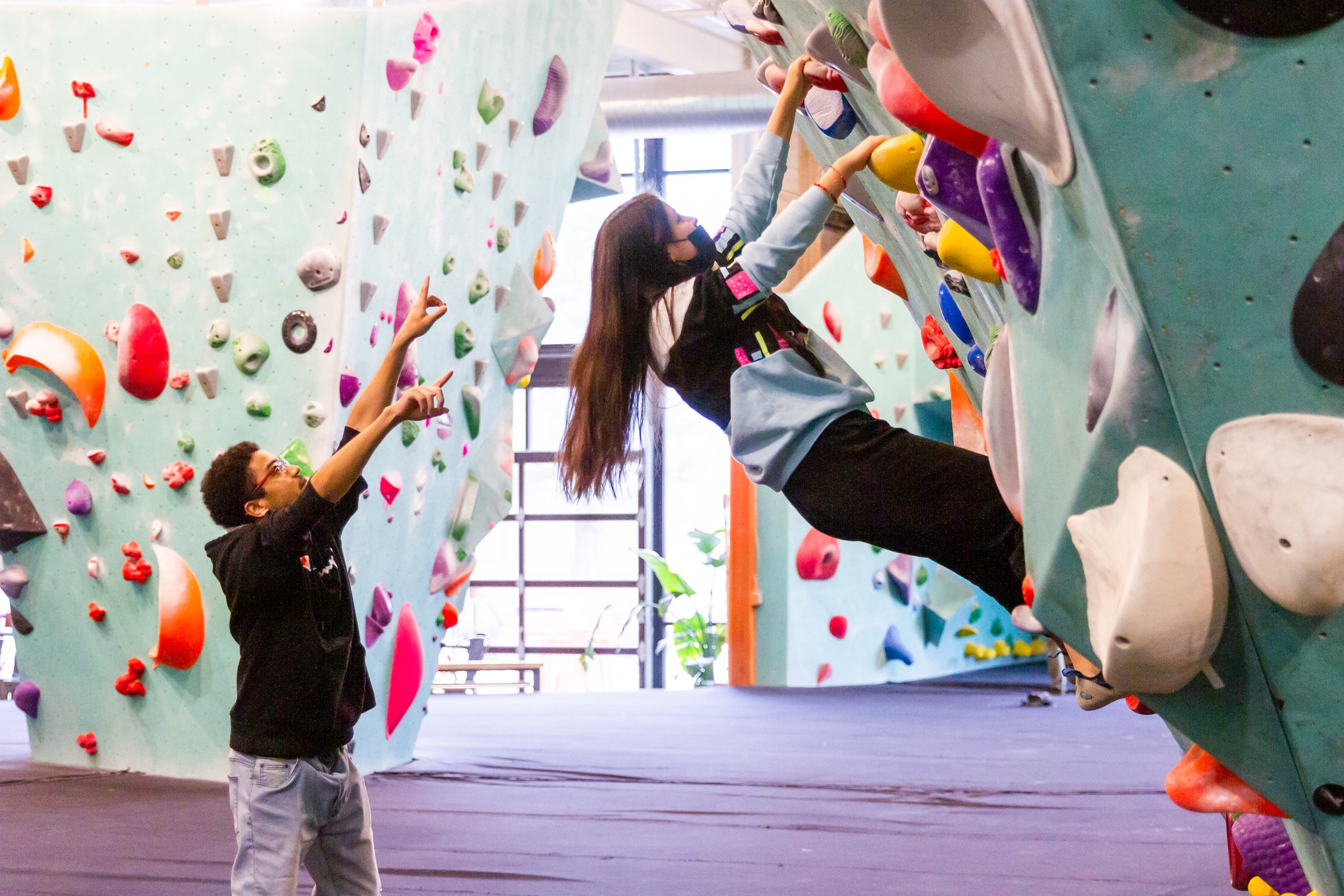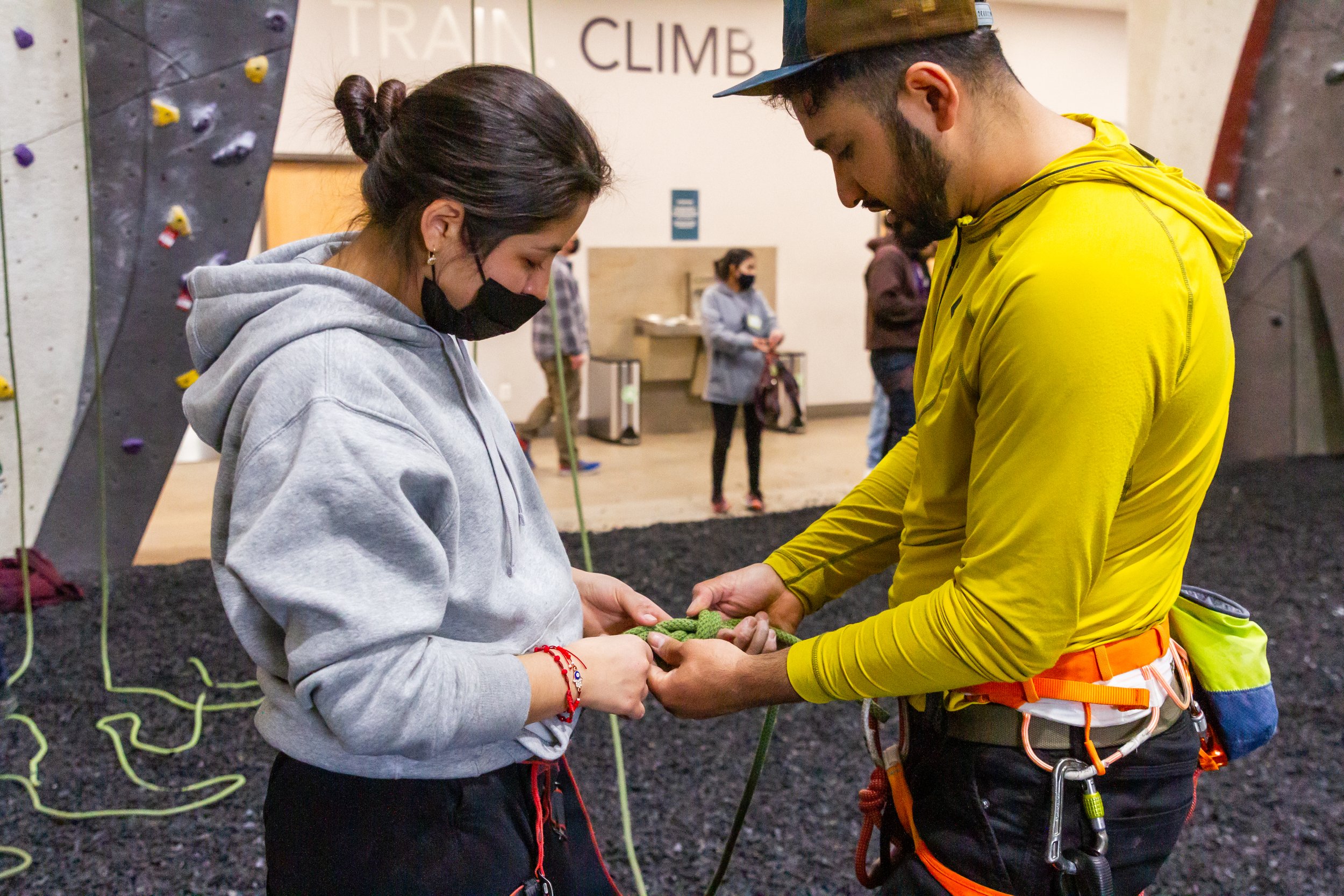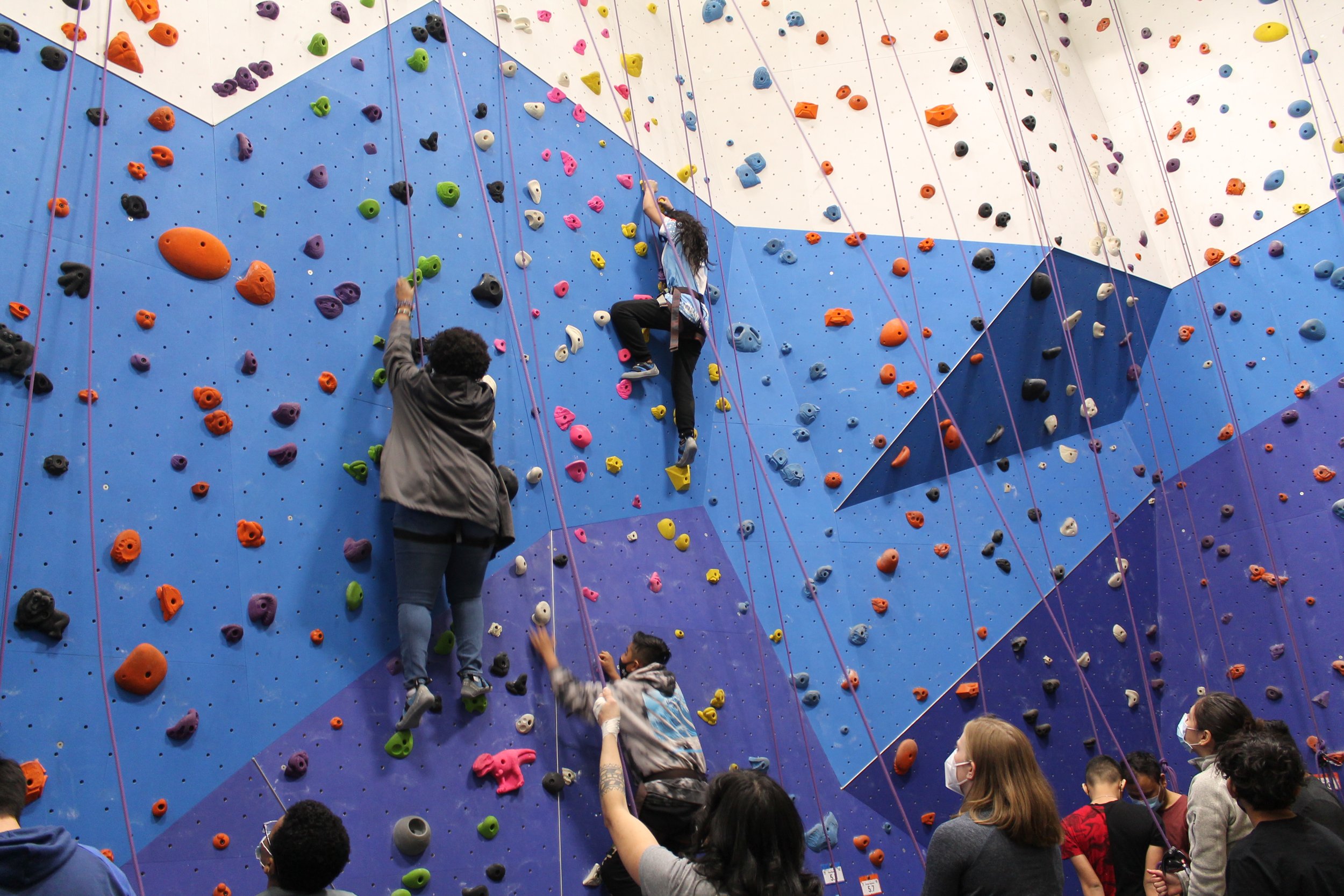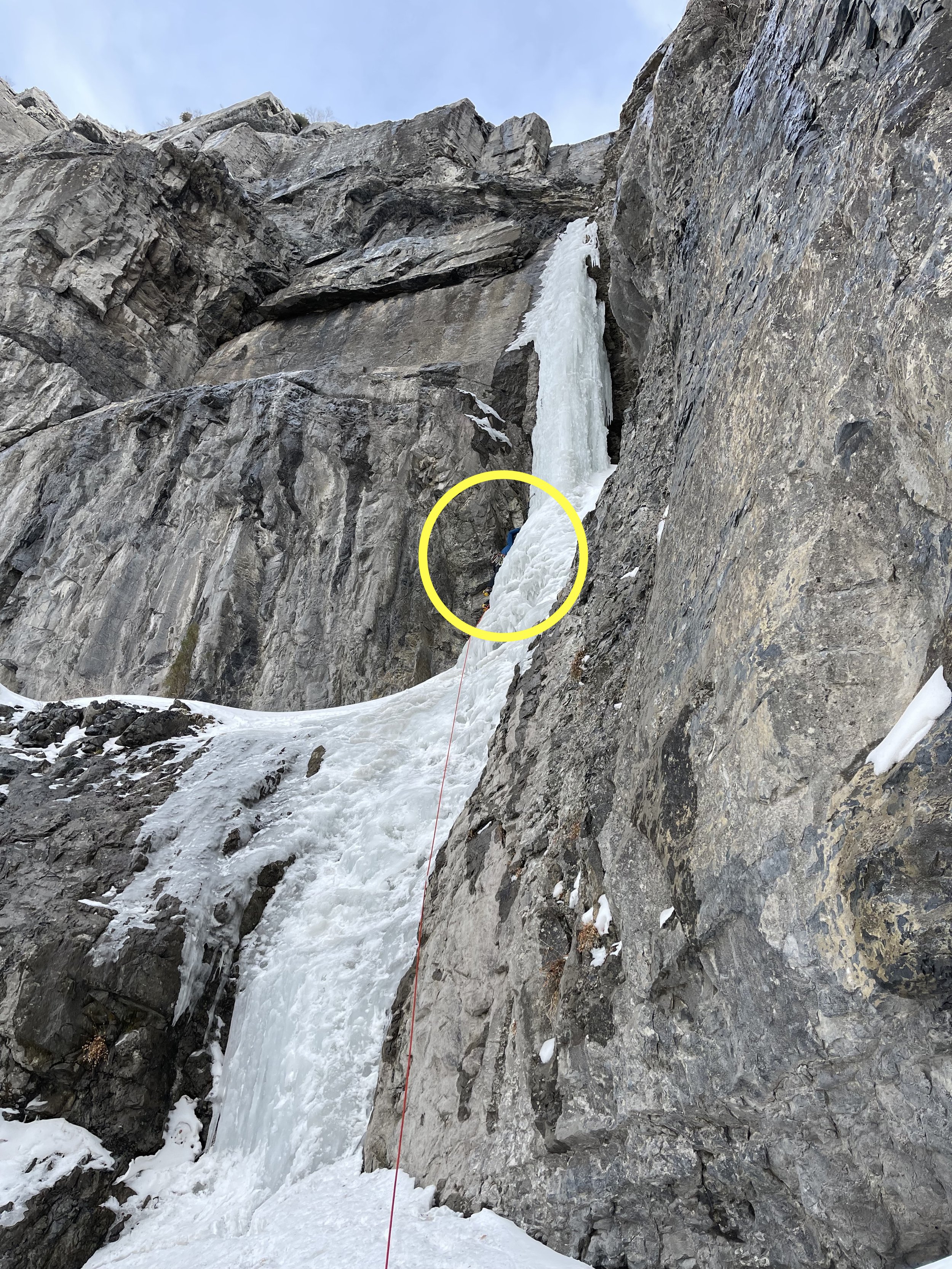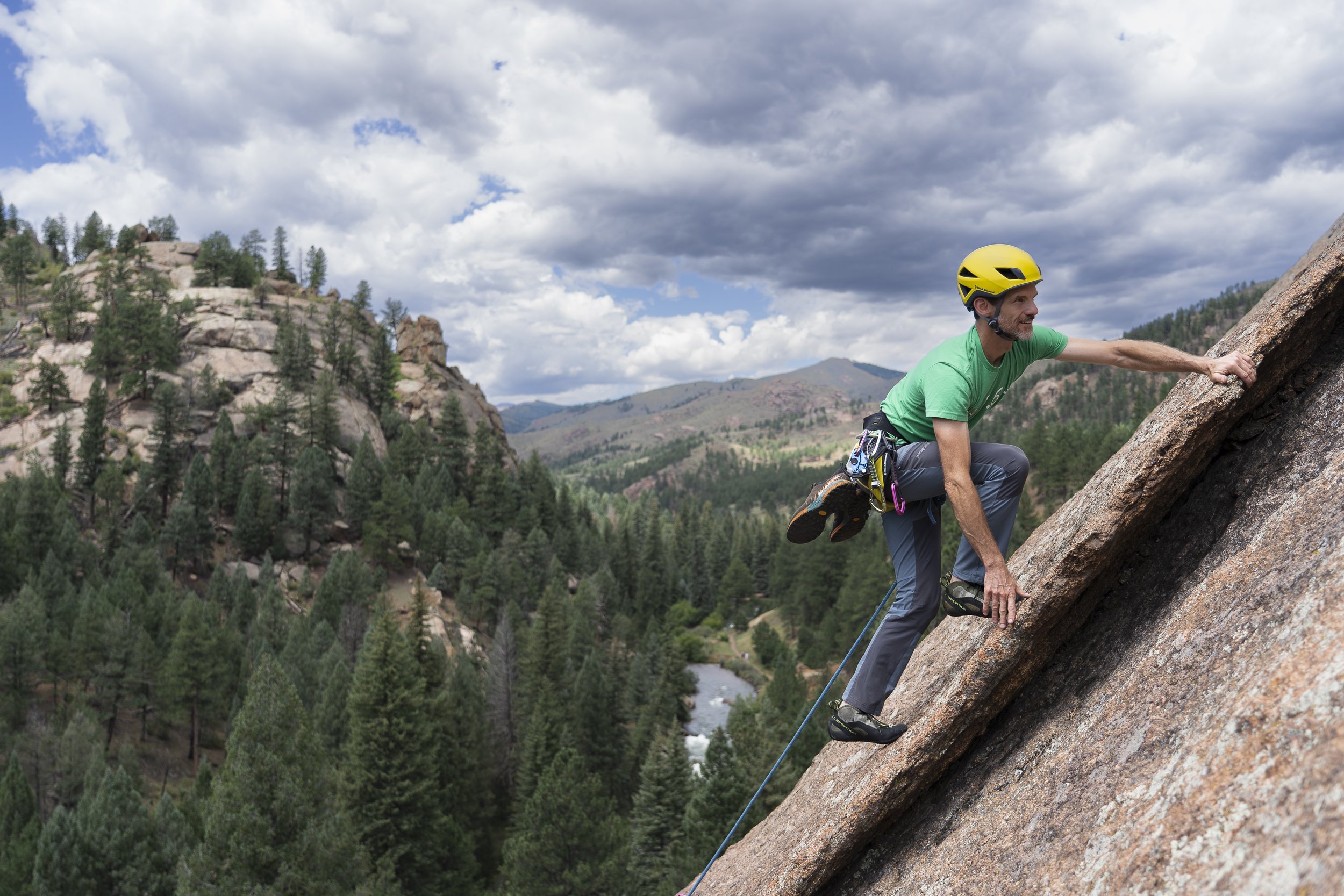The AAC Twin Cities Chapter partners with Spanish speaking communities to bring people climbing.
PC: AAC Twin Cities DEI Initiatives Chapter Chair Rodel Querubin
Grassroots: Unearthing the Future of Climbing
By: Sierra McGivney
As the leaves change, students flood classrooms, back to school for another semester. Students at El Colegio Highschool, a small charter school in South Minneapolis, always wondered why their teacher Steve Asencio was covered in bruises and cuts.
When the school bell rang Asencio was at his local climbing gym, hanging out with friends while bouldering and top-roping. Each time, he'd come away from the climbing wall with bruises and scrapes—practically a requirement for climbers.
Asencio found climbing through the BIPOC events put on by the AAC Twin Cities Chapter in 2021. The space for new learners and community grown by Rodel Querubin, the Twin Cities DEI Initiatives Chapter Chair, allowed Asencio to immerse himself in climbing. Asencio even applied for the AAC-TC BIPOC Ice Climbing Scholarship in 2021 and was able to attend Michigan Ice Fest to hone his skills further.
PC: AAC Twin Cities DEI Initiatives Chapter Chair Rodel Querubin
When Asencio saw an opportunity to bring his passion for climbing to the classroom he reached out to Querubin. Twice a year students at his school participate in an interim week in which the teachers design a three-hour-long class of their choice.
Ascencio emailed Querubin: do you think that we could create some sort of class and partnership to teach students how to climb? Querubin didn’t hesitate, Yes. He didn’t even know if he could make this happen or where funding would come from, but Querubin is committed to keeping as many doors open as possible in his work, so he decided he would find a way.
El Colegio is not your average high school. The school is a tuition-free charter school with a focus on community-building and social justice. The staff is fully bilingual and has been recognized locally and nationally as an innovative force in improving achievement for Latino students and other students of color. As Asencio talked to students about climbing he realized how inaccessible it was to them. Very few students had climbed before and if they had, they had only done so in their native countries.
“I felt like I was that student. I grew up in Atlanta, I didn't climb until I came to Minnesota and was 26 or 27 years old,” says Asencio.
A student from El Colegio high school, climbing at Vertical Endevours. PC: AAC Twin Cities DEI Initiatives Chapter Chair Rodel Querubin
Giddy and scared, the kids tied in at Vertical Endeavors. Shouts of encouragement filled the gym as the kids pushed one another to climb. Asencio would watch a kid get stuck on a route and walk by thirty minutes later to the same kid finishing up.
“I think that, to me, was just super powerful as that can translate into life,” says Asencio.
Being able to complete something new after being scared of what lies on the other side is a huge accomplishment. A lot of the students at El Colegio are originally from countries such as Ecuador, Mexico, El Salvador, Guatemala, and Honduras. A few kids had only been to school, work, and home. They didn’t have the opportunity to go anywhere outside of those three settings. The students got to be in a space that is completely new while also being fulfilling, rewarding, and challenging.
“I was very impressed with [the students]. I think they kind of took on that challenge,” says Asencio.
Asencio’s goal has always been to expose the students to climbing with the hopes that they will, in turn, expose their family, friends, and others. This is how they begin to create a Spanish-speaking space within the climbing community.
PC: AAC Twin Cities DEI Initiatives Chapter Chair Rodel Querubin
News spread fast through the school that Mr. Asencio’s interim climbing class was cool. Asencio had kids running up to him exclaiming that they had to be in his class. The class has become one of the most popular and spots are limited. Asencio is always trying to see how he can get as many interested kids on the wall. In the second semester, Asencio had a few returning students who helped teach the new kids the ropes.
“Most inspiring and touching to me was that two of the students who had participated during our first events in October of last year returned for this latest round and were able to teach the rest of their class how to belay instead of me—in Spanish,” says Querubin.
Luisana Mendez the founder of Huellas Latinas, a hiking club based in Minnesota oriented toward Spanish-speaking individuals, found climbing in the same way Asencio did, through the events that Querubin hosted. She approached Querubin about a partnership to take participants in the hiking club, climbing. Although Huellas Latinas is primarily a hiking club, being outdoors is what brings everyone together, no matter the activity.
Huellas Latinas gearing up to climb. PC: AAC Twin Cities DEI Initiatives Chapter Chair Rodel Querubin
At the time Querubin didn’t have a framework or funding for an event. After the success of the climbing event at El Colegio highschool, Querubin reached back out to Luisana Mendez to restart the conversation about hosting an event alongside Huellas Latinas.
“I feel like those types of communities are the exact spaces where we want to be expanding the reach of climbing and the possibility of it—folks who are already interested in the outdoors but maybe don’t see themselves in climbing or just aren’t aware of the resources to them,” says Querubin. “Any number of things that we take for granted as far as access to climbing, [we can address those obstacles.] I want to make sure that those communities see that those opportunities are available.”
PC: AAC Twin Cities DEI Initiatives Chapter Chair Rodel Querubin
They hosted two different events, one rope climbing, and one bouldering. Participants loved it. Everyone was enthusiastic about the opportunity to try something they wouldn't necessarily see themselves doing.
If participants decided they enjoy climbing after the event, they could attend the weekly BIPOC climbing events put on by the AAC Twin Cities Chapter.
“We’ve been seeing some of those folks join in on BIPOC events, so that was the beauty of that, not just having these one-off events but then the ability for them to join in on our more regularly scheduled events,” says Rodel.
Everyone loves a good party. Big events like Craggin’ Classics and Flash Foxy draw in all types of climbers, who get to socialize and celebrate climbing. The issue is, what happens to those climbers who got introduced to climbing at the big event? What support network is in place to allow them to continue climbing and form the community needed in order to continue their climbing career? Running smaller, more frequent events, like the AAC Twin Cities Chapter is able to do, allows a community to build organically and supports the folks who are pulled in by exciting one-off events.
Working with Huellas Latinas and El Colegio has been part of a bigger push to partner with other groups and organizations to bring them into climbing. In 2020, the pandemic in conjunction with the murder of George Floyd made Querubin, his fellow members, and the leadership team at the Twin Cities Chapter reevaluate what they wanted their priorities to focus on. They took some time to focus on how best to address systemic racism, inequities, and the imbalance of access. Phase one: Create a space for BIPOC communities through gym partnerships and events.
PC: AAC Twin Cities DEI Initiatives Chapter Chair Rodel Querubin
“When you take a step back there are very specific responsibilities and intentionality when you run BIPOC spaces. Or at least there should be. And so what that means is not just having these events, but also making some very specific and intentional invites to communities and relationship building,” says Querubin.
Phase two was to invite communities to get involved and be represented in the climbing community. Part of the purpose of introducing climbing to groups that had already built a community, like students from El Colegio high school and participants of Huellas Latinas, was to ensure the individuals participating felt safe and welcomed through a partnership they already trusted. After the events, participants had the opportunity to advance in climbing if they were interested in doing so with the AAC Twin Cities Chapter.
“I wanted to start up this program, which was to help communities so that we aren’t gatekeeping that knowledge, where we’re empowering their community and to then have leaders in their communities,” says Querubin.
PC: AAC Twin Cities DEI Initiatives Chapter Chair Rodel Querubin

